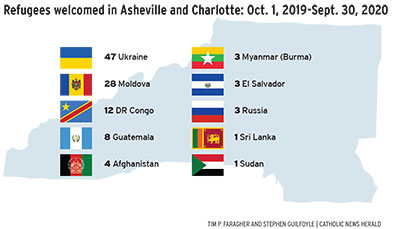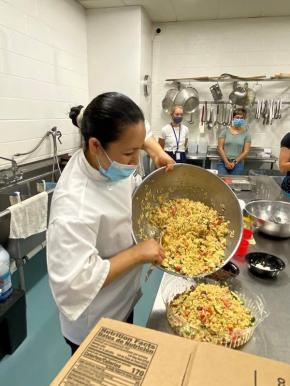CHARLOTTE — Eight schools are receiving a total $173,400 to use for tuition assistance this fall, thanks to the Diocese of Charlotte’s “Forward in Faith, Hope, and Love” campaign. It is the highest amount given out since the aid program began.
The $65 million FFHL campaign is funding capital projects, endowments and other needs across the growing diocese. Included in the campaign is a tuition assistance endowment available to the diocese’s 19 schools. The endowment has more than $4.7 million in assets.
The $173,400 will go to eight diocesan schools that applied for the 2021-’22 school year. The funds are expected to help dozens of participating Catholic families who have the greatest financial need.
Tuition assistance funds were awarded to: Asheville Catholic School, $77,833; Bishop McGuinness High School in Kernersville, $22,963; Immaculata School in Hendersonville, $16,576; Immaculate Heart of Mary School in High Point, $18,432; Our Lady of Grace School in Greensboro, $3,470; Sacred Heart School in Salisbury, $21,734; St. Leo School in Winston-Salem, $5,492; and St. Michael School in Gastonia, $6,900.
“Devoting FFHL funds to tuition assistance makes a difference in our parish schools,” said Catherine Rusch, Our Lady of Grace School’s principal. “It makes a mission-driven Catholic education a reality for families who would not be able to attend otherwise.”
“The FFHL tuition assistance endowment allows principals to make Catholic education more accessible in their communities,” explained Allana Ramkissoon, assistant superintendent of schools. “It is our goal to provide an environment where young people are formed through Gospel teachings and are able to pursue excellence as fully alive disciples of Christ. A partnership with parishes makes this possible through tuition assistance, and communities are enriched tenfold by the contributions.”
The FFHL tuition assistance endowment is administered by a committee consisting of the diocese’s schools superintendent, chief financial officer and members of the diocesan school board. Available income from the endowment is distributed to qualifying diocesan schools that apply each year for student financial aid.
An endowment is a permanent fund, the principal of which is never touched, but the income from which can be used according to the wishes of the donor organization or person. Endowments provide a way to generate income and help sustain the long-term strength and viability of the recipient parish, school or ministry.
To date, a total of $600,230 has been awarded to the diocese’s schools. In its first year in 2017, FFHL tuition assistance totaling $49,372 was given out to four diocesan schools. In 2020, $152,213 was awarded to seven schools.
To qualify for the tuition assistance money, the school must receive local parish support of at least $500 per participating Catholic student and must have awarded all of its tuition assistance funds it already has for that school year. Schools that do not receive $500 per student in parish support may be considered if there are extenuating financial circumstances that preclude this level of support. Qualifying schools may request funds from the FFHL endowment for participating Catholic students with a financial need (determined to be 75 percent or more of the family’s full tuition and fees, as determined by a third-party company).
The tuition assistance endowment is one of seven endowments funded through the FFHL campaign.
“The FFHL campaign continues to have a significant impact on the work being done in parishes and in ministries across the diocese that provide services to parishioners,” said Jim Kelley, diocesan director of development.
— SueAnn Howell, Senior reporter
Catholic Charities staffing up to resettle victims of war, persecution
 CHARLOTTE — The Diocese of Charlotte expects to welcome hundreds of refugees over the next year, a return to normal after a decline caused by the pandemic and federal policy changes.
CHARLOTTE — The Diocese of Charlotte expects to welcome hundreds of refugees over the next year, a return to normal after a decline caused by the pandemic and federal policy changes.
The Catholic Church is one of the largest refugee resettlement agencies in the United States. In partnership with dioceses, the Church through the U.S. Conference of Catholic Bishops’ Migration and Refugee Services Office resettles approximately 30 percent of the refugees who arrive in the U.S. each year. Catholic Charities manages the resettlement process here in western North Carolina, helping refugees work toward self-sufficiency and eventually attain citizenship.
Their resettlement offices in Charlotte and Asheville anticipate receiving more refugees as the government-imposed cap is raised and the Asheville office expands its operations.
Sandy Buck, who heads up the refugee resettlement program for Catholic Charities, expects refugee arrivals to return to typical levels starting next fiscal year, which begins Oct. 1.
“The expectation from the USCCB is that we will receive 400 total refugees in Charlotte over the next year, which ends Sept. 30, 2022,” Buck said. Of those, she added, 25 are expected to be special immigrant visas for Afghani translators who helped the U.S. military during the war in Afghanistan.
Pandemic, policy limited arrivals
Refugees are victims of war, political upheaval, religious, economic or ethnic persecution. Many are forced to leave homes, jobs and families to stay alive. Refugees pay taxes in the U.S. and repay their travel expenses.
Helped by funding from the USCCB and the state, Catholic Charities’ staff work with refugees in both the short and long term, up to five years, to find housing, health care, schools, community and cultural orientation, and budgeting and financial education. They also offer employment assistance, driver’s education, interpretation services and transportation to initial appointments.
The COVID-19 pandemic, combined with the Trump administration’s decision to reduce the number of refugees coming in to the United States, dropped refugee arrivals to historically low levels.
From Oct. 1, 2019 to Sept. 30, 2020, Catholic Charities resettled 110 refugees. This current fiscal year, the agency has resettled 44 refugees, 26 in Charlotte – that’s what the agency used to resettle in one month, Buck said.
Buck said they could resettle another 50 or so people before the year ends Sept. 30.
The pace is expected to pick up in 2022, with as many as 400 new arrivals – part of the Biden administration’s move to raise the prior administration’s cap on refugees from 15,000.
Biden said the previous administration’s cap did not reflect the country’s values “as a nation that welcomes and supports refugees.”
The president acknowledged it will be difficult to meet the new higher number, however. “The sad truth is that we will not achieve 62,500 admissions this year. We are working quickly to undo the damage of the last four years. It will take some time, but that work is already underway,” he said in a statement.
Because of the low number of arrivals over the past couple of years, the Refugee Resettlement Office reduced its staff, so now it has to rebuild the program to be prepared to welcome the higher influx of refugees.
Catholic Charities has received funding to hire and train new staff before more refugees start arriving in October, Buck said. There are two active job listings, and she said she anticipates more hiring in both Charlotte and Asheville.
The good news is that the arrival numbers are expected to ramp up over time, she said. “I don’t anticipate all the arrivals to start happening immediately. It’ll gradually start increasing. It’s going to take a long time to rebuild the pipeline overseas.”
The COVID-19 pandemic and resulting travel restrictions will continue to slow down refugee arrivals, Buck said, as processing of refugees’ applications has always been done in person. Countries are working on how to do that safely when not every country has as much access to the vaccines as the United States does.
Although the Charlotte and Asheville offices often saw months pass with no incoming refugees in 2020 and 2021, both have remained busy, Buck noted. Staff reached out to refugees already settled here to see if they needed help due to the economic impacts of the pandemic, such as job loss. Support has included supplies from the food pantry or help paying back-due rent or utilities.
“We spent a lot of time making sure everyone is still doing well,” Buck said.
Asheville office expanding
In a related move, Catholic Charities’ Asheville office is expanding its resettlement operations starting this fall. Instead of helping only refugees already in the area apply to bring family members here, the agency’s mandate will include resettling new refugees. As a designated “sub-office,” they will begin receiving a number of refugees to settle, starting with an estimated goal of 150. So for the first time, the staff will work to set up housing for incoming refugees, too, Buck said. Volunteers and donations of household items to set up apartments will be needed.
— Kimberly Bender, Online reporter
How can you help?
At www.ccdoc.org: Find out how to volunteer or donate to help the Refugee Resettlement Offices in Charlotte and Asheville welcome refugees
Refugee children have fun, learn at summer camps
 Show GalleryCHARLOTTE — Refugee children recently resettled in Charlotte have spent their summer learning and having fun in new ways.
Show GalleryCHARLOTTE — Refugee children recently resettled in Charlotte have spent their summer learning and having fun in new ways.
Elementary through high school students are attending the Refugee Youth Summer Camp two days a week, said Kayla Mitchell, Refugee Youth Program assistant facilitator.
“We try to expand on different things they already know and introduce them to new activities through field trips and enrichment activities,” Mitchell said. “From the feedback we’ve received, they’re really enjoying it.”
Field trips included a trip by the elementary students to Jubilee Farms to learn how a farm works and Discovery Place Museum.
The older students went to Carowinds, sponsored by Allegiance Staffing, and took two college tours – to Queens University of Charlotte and the University of North Carolina at Charlotte – to learn about possibilities in higher education.
The students also had craft days, learned about different careers including cooking, met with law enforcement officers and firefighters, explored different sports, participated in a field day and even went swimming.
For some of the students, it was their first time participating in these types of activities.
There are 14 elementary students and 23 middle and high school students enrolled in the camps. This year marks a return to summer camps, as COVID-19 restrictions prevented them last year.
— Photos provided by Catholic Charities Diocese of Charlotte

